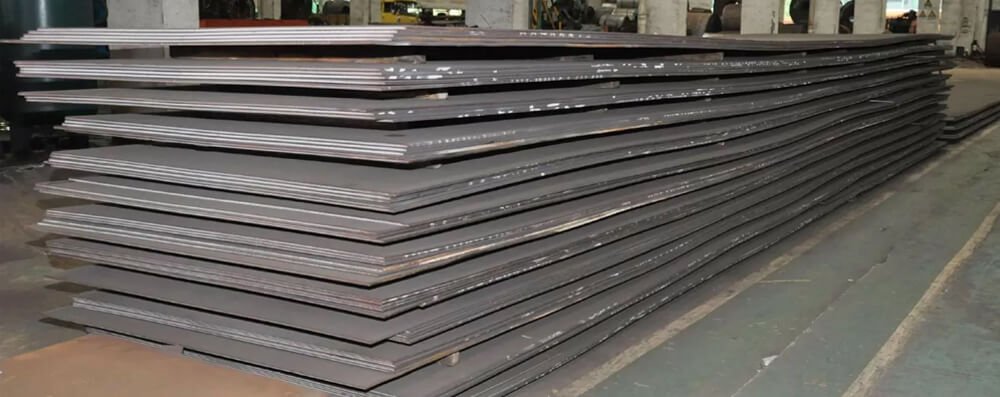Introduction
IS 2062 is an Indian Standard specification for hot-rolled low-carbon steel. Widely used for structural purposes, IS 2062 steel exhibits good weldability, machinability, and mechanical strength. It is available in multiple grades like IS 2062 E250, E350, and E410, depending on specific mechanical properties and applications.
Uses/Applications of IS 2062 Grade:
- Structural fabrication (beams, channels, angles)
- Construction of bridges and industrial structures
- Shipbuilding and offshore structures
- Storage tanks
- Transmission towers
- Automotive chassis and frames
- Railway equipment
- Heavy machinery parts
- General engineering applications
Properties of IS 2062 Grade:
- Excellent weldability and formability
- Good tensile and yield strength
- High toughness and ductility
- Can be easily machined and fabricated
- Cost-effective material for structural applications
- Available in multiple grades to suit different strength requirements
Chemical Composition (Typical):
| Element | Content (%) for IS 2062 E250 |
| Carbon (C) | 0.23 max |
| Manganese (Mn) | 1.50 max |
| Sulfur (S) | 0.050 max |
| Phosphorus (P) | 0.050 max |
| Silicon (Si) | 0.40 max |
| Copper (Cu) | 0.20 max |
| Iron (Fe) | Balance |
Note: Composition may slightly vary for different grades like E250, E350, and E410.
Physical Properties:
| Property | Value |
| Density | ~7.85 g/cm³ |
| Melting Point | ~ 1450 – 1520 °C |
| Modulus of Elasticity | ~ 200 GPa |
| Thermal Conductivity | 45 – 55 W/m·K |
| Specific Heat | 450 J/kg·K |
| Electrical Conductivity | Low (typical of mild steels) |
Mechanical Properties (Typical):
| Property | IS 2062 E250 (Grade A/B) | IS 2062 E350 | IS 2062 E410 |
| Yield Strength | 250 MPa (min) | 350 MPa (min) | 410 MPa (min) |
| Tensile Strength | 410 – 540 MPa | 490 – 630 MPa | 520 – 680 MPa |
| Elongation | 23% (min) | 20% (min) | 19% (min) |
| Impact Strength | 27 Joules (at 0°C) | 27 Joules (at 0°C) | 27 Joules (at 0°C) |
Forging
IS 2062 grade steel is suitable for forging. Forging temperatures range from 1100 °C to 1250 °C, followed by controlled cooling. Post-forging normalization or annealing is advised to improve microstructure and mechanical properties.
Heat Treatment:
- Annealing: Can be annealed at 840 – 910 °C followed by slow furnace cooling.
- Normalizing: Performed at around 890 – 940 °C followed by air cooling to enhance toughness.
- Stress Relieving: Done at 540 – 650 °C after fabrication to minimize residual stresses.
- Hardening: Not typically hardened by quenching due to its low carbon content, but surface hardening can be done if needed.
Dimensional Tolerances:
Bars produced under IS 2062 are governed by standards such as IS 1852 for dimensional tolerances:
- Hot Rolled Bars: Tolerances depend on size, with typical variations of ±2% for diameter and ±1.5% for length.
- Cold Finished Bars: Tighter tolerances can be achieved, such as ±0.2 mm for round bars.
Machinability:
IS 2062 offers good machinability, especially when supplied in normalized or annealed condition. Its machinability improves when cutting tools are sharp, appropriate coolant is used, and standard machining parameters are applied. Machinability rating is around 55–65% compared to free-cutting steels.
Corrosion Resistance:
IS 2062 carbon steel has moderate corrosion resistance under normal atmospheric conditions. However, it is prone to rusting if exposed to humid or saline environments without protection. Surface treatments like painting, galvanizing, or coating are recommended for outdoor or corrosive service.
Weldability:
IS 2062 steel exhibits excellent weldability and can be welded using:
- Shielded Metal Arc Welding (SMAW)
- Gas Tungsten Arc Welding (GTAW/TIG)
- Gas Metal Arc Welding (GMAW/MIG)
- Submerged Arc Welding (SAW)
Preheating may be necessary for thicker sections to avoid cracking, and post-weld heat treatment may be applied for stress relief in critical structures.
Available Form:
- Hot Rolled Round Bars
- Square Bars
- Flat Bars
- Angles
- Channels
- Plates
- Sheets
- Coils
- Structural sections (beams, joists)
Available in various sizes and customized lengths as per project requirements.
Conclusion:
IS 2062 carbon steel bars are an essential material for a variety of structural, engineering, and fabrication industries. Their excellent mechanical properties, ease of machining, weldability, and cost-effectiveness make them a preferred choice for critical applications. Although they require protective treatments against corrosion, their strength and versatility ensure long-term, reliable performance in numerous environments.
Related Products :20C8, ASTM A36, 20MN2, 55C8, 40C8, C45, ASTM SA-105, C50, C20, C55, EN3B, C55 Mn2, C60, C45, EN9, EN8, EN8D, IS 2062, EN43B, S355J2G3, S40C, SAE 1010, SAE 1018, ST52.3, 20MN2, Maps


